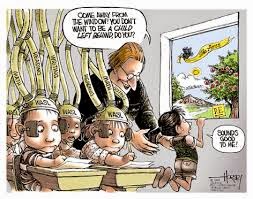By Allan Alach
I welcome suggested articles, so if you come
across a gem, email it to me at allan.alach@ihug.co.nz.
This week’s homework!
Thinking
Good thinking in this article by Gary Stager.
 |
| Papert |
‘Piaget
teaches us that “knowledge is a consequence of experience.” Schools
and teachers serve students best when the emphasis is on action, not
hypothetical conversations about what one might do if afforded the opportunity.
Papert was sadly correct
when he said, “When ideas go to school, they lose their power.”’
Self-Directed Learning: Lessons from the Maker Movement in Education
Continuing the Piaget theme…
“Learning
through the making of things is a concept as old as education. As psychologist
Jean Piaget argued, knowledge is a consequence of experience. But somehow, with
the exception of a
small number of schools and vocational education programs
dedicated to experiential inquiry-based learning, our nation’s schools strayed from this hands-on approach to education, spending
much of the past 50 years focusing intensely on the memorization of
information. Information matters, of course, but a growing number of schools
and educators are reclaiming our educational roots, aiming to help kids learn
by making stuff — but this time with a technological twist.”
.jpg) |
| The Maker Movement manifesto |
The Purpose Of Education
 |
| Ivan Snook NZ |
The conflict continues…
Here’s
a response to the call from England for a return to ‘chalk and talk’
teaching.
“So
that's it then – let's sit back and watch the pendulum
swing. With politicians and university professors professing it to be so it
must be correct – right? Wrong. Let's put a bit of
perspective on things shall we.”
“The
worst possible model” – how charter schools have been introduced
in New Zealand
Rethinking The Use Of Simple Achievement Gap Measures In School
Accountability Systems
“Finally,
we should also stop using gaps and gap trends in our public discourse about
school performance per se. They are measures of student performance (and, when
measured within schools, limited ones at that). The goal should be to provide
educational opportunity for all, not try clumsily to ensure equal outcomes by
rewarding and punishing schools based on the degree to which they exhibit those
equal outcomes. In an accountability context, there is
a crucial difference.”
Emotional Intelligence
“This
leads me to challenge what we just take for granted—what
is the purpose of schools. Most of use rarely think deeply about this question,
and assume it is self evident—and that it is primarily“academic.”
But how about this thought experiment; What if we turned this on its head? What
if we thought the primary responsibility of schools was to get a citizenry that
has a strong social/emotional education? “
New Research: Students Benefit from Learning That Intelligence Is
Not Fixed
“Teaching
students that intelligence can grow and blossom with effort – rather
than being a fixed
trait they’re just born with – is
gaining traction in progressive education circles. And new research from
Stanford is helping to build the case that nurturing a “growth
mindset”
can help many kids understand their true potential.”
 |
| Check out link to Carol Dweck |
This week’s contributions from Bruce Hammonds:
Time to return the focus back to
encouraging creative teachers - the only real way to transform our education
system.
 |
| Creative classroom from the 70s! |
“I believe it is vitally important to encourage creative teachers who
focus on providing engaging programmes and who develop personalised programmes
able to develop the gifts and talents of all students.”
Project Wildthing
Bruce's comment:
.jpg) |
| Real learning through senses |
Bruce continues: Read the below blogs for
further inspiration.
“I am furious, incensed, and irate at your November 3, 2014, cover
depicting every American public school educator as a Rotten Apple and a
billionaire from Silicon Valley as the savior of American public schools. So forgive me, if this Rotten Apple, tells you exactly what I think
of your reporting since you never bothered to interview a public school teacher
for your piece.”
States Listen as Parents Give Rampant
Testing an F
.jpg) |
| Test crazy systems killing learning |
“Florida embraced the school accountability movement early and
enthusiastically, but that was hard to remember at a parent meeting in a high
school auditorium here not long ago.
Secrets of the Creative Brain
.jpg) |
| Not always easy in our School system |
Bruce’s comment: A
rather long but important read. Do schools foster the creative brain – I
think not. And schools are certainly no place for creative teachers.
Do we have the wrong schools for an age
based on connections? Seth Godin
“Seth sees schools reflecting the needs of a past factory based industrial age - one that provides
workers who were compliant, schools where
productivity can be defined and measured.The development of such factory like schools, he believes, is not a
coincidence. Now, he writes, is the time for a new
set of questions and demands and to consider how schools need to change to develop the new
dispositions young workers need in a connected age. “





.jpg)

No comments:
Post a Comment